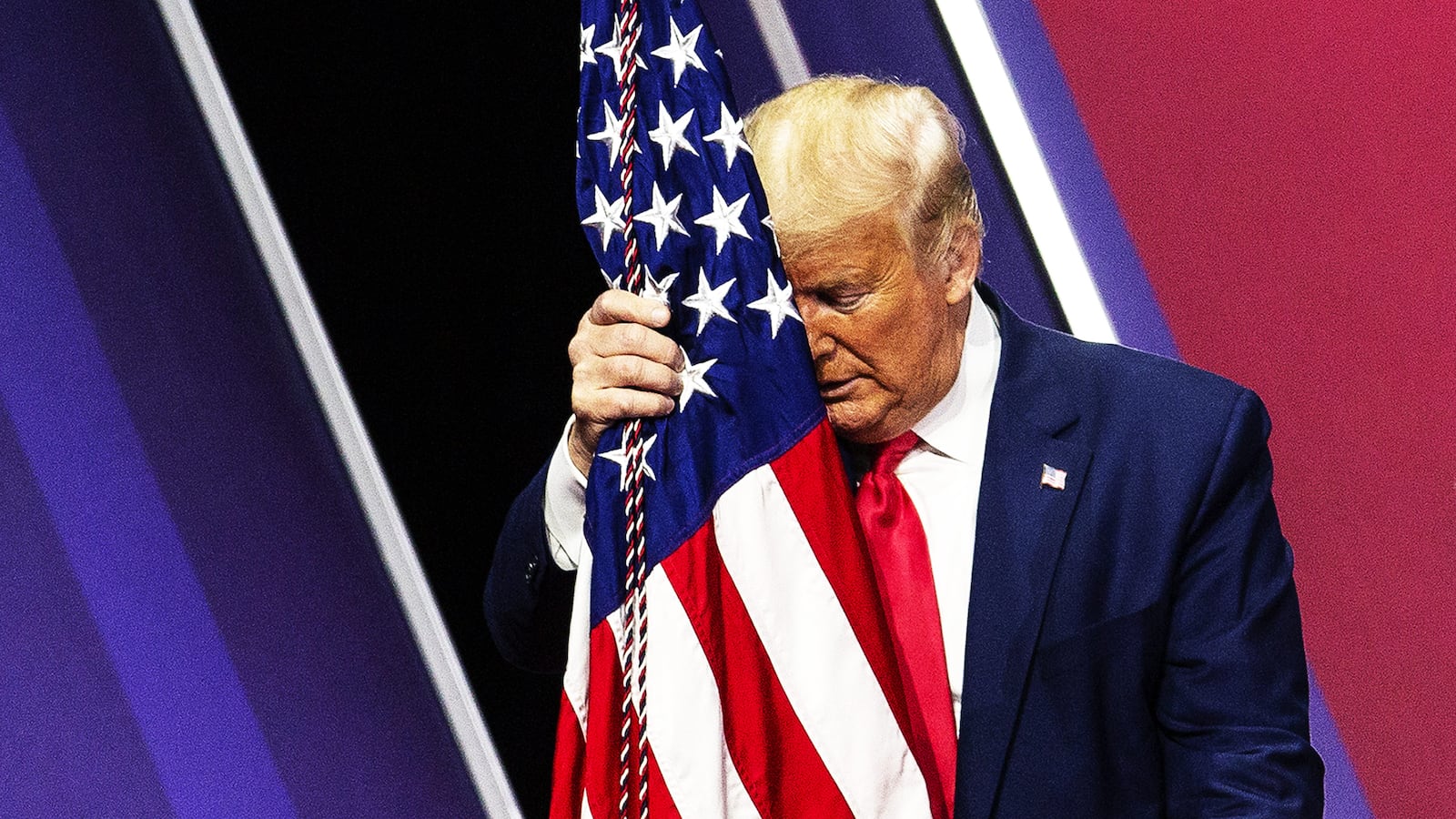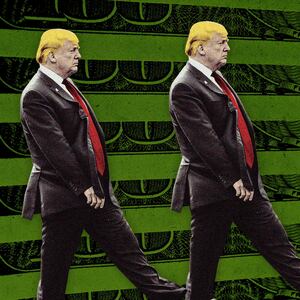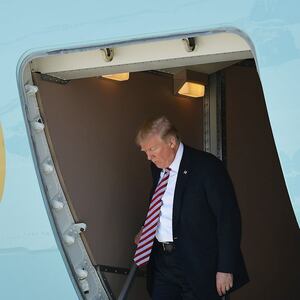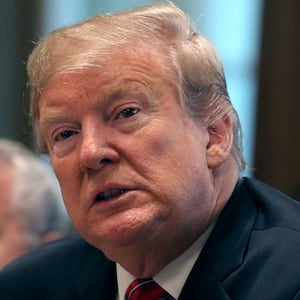For 59 years, Congress has passed and the president has signed the National Defense Authorization Act. So why is Donald Trump threatening to veto this year’s $700-billion-and-change plan, which has broad bipartisan support and is widely seen as critical to national security?
Trump has objected to a provision that would change the names of military bases named after Confederate officials and to a non-defense add-on that would preserve a piece of the 1996 Telecommunications Act shielding tech companies from liability for content posted by their users.
None of that explains why he’d risk a humiliating veto override to shoot down a popular bipartisan bill. One thing that would explain his bizarre position here is another add-on: one that could expose financial arrangements that Trump would prefer to keep hidden.
That’s a bill that emanated from the House of Representatives, was folded into its Senate analog called the Corporate Transparency Act that was then attached to the NDAA after passing the Senate on a veto-proof 86-14 vote. Congresswoman Carolyn Maloney started working on the Illicit Cash Act—a mouthful of an acronym for Improving Laundering Laws and Increasing Comprehensive Information Tracking for Criminal Activity in Shell Holdings—in 2007 to modernize federal money-laundering laws. It requires shell companies to report their beneficial owners, thus preventing exploitation of U.S. companies by shell companies controlled by rogue nations, terrorists, drug traffickers, weapons smugglers, sex traffickers, and other criminal operators—maybe even vainglorious tax-evading money launderers.
If this legislation had been in place in the mid-1990s, the Trump family may have been inhibited from setting up the shell company All County Building Supply & Maintenance whose main purpose, according to epic reporting by The New York Times, was “to enable Fred Trump to make large cash gifts to his children and disguise them as legitimate business transactions thus evading the 55 percent tax.” Who knows what shell companies profiting Donald Trump have yet to be exposed, and could be with the passage of this Act?
“Currently, the U.S. is at the bottom of the pack with respect to corporate transparency,” Maloney has said. “In many states, more personal information is needed to obtain a library card than to establish a legal entity that can be used to facilitate tax evasion, money laundering, fraud, and corruption. The U.S has been identified in several studies as one of the easiest jurisdictions in which to open an anonymous company.”
Recall Ike Kaveladze, the so-called ‘eighth man’ at the infamous 2016 Trump Tower meeting with Natalia Veselnitskaya. Twenty-something years ago, Kaveladze opened up over 2,000 Delaware shell companies and set them up with bank accounts at a now-defunct bank in San Francisco and also with Citibank. These shell companies were used to launder over a billion dollars through Latvia. Senator Carl Levin called Kaveladze—who has never been convicted of a crime and who called the Government Accountability Office report (PDF) detailing his shell companies “a witch hunt”—a “poster boy for money laundering.”
“Beyond the impacts for law enforcement,” Maloney has noted, the Illicit Cash Act, “will directly affect us here at home by lowering housing costs in New York City,” where shell companies parking money in high-end real estate have cut into housing supply and pushed up real estate costs for everyone else. That includes many of the 1,300 Trump condominiums that were purchased with all cash by anonymous shell companies, according to a Buzzfeed investigation.
A New York Times analysis of Trump’s financial records recently concluded that he has liabilities approaching $420 million, with the bulk of that bill coming due in the next few years. If Maloney is right, then the Illicit Cash Act represents a direct financial threat to him. Are there any others?
Well, how about the undisclosed bank accounts tied to Trump that the Times found in Ireland, the UK, and China? It revealed that his secret China account, which millions poured into and out of, was actually in the name of one of the 500 limited liability companies owned by Trump that we know of. How many other LLCs does he own that we don’t know of?
The broker for Trump Sunny Isles development in Florida, Elena Baranoff, who was once described on the cover of a Russian magazine as “Trump’s Russian Hand,” sold countless units in that development to anonymous Russians purchasing through shell companies. When Baranoff died in 2014, David Correia and Lev Parnas, the Rudy Giuliani associate now facing fraud charges, picked up her brokerage business for the Trump development while setting up their own shell company called Mendo Cali LLC which they also leveraged into brokering investment by Russians into potential budding cannabis businesses out west. Baranoff and then Parnas were following in the footsteps of Dolly Lenz, the broker who reportedly sold 65 units in Trump World Tower in the 1990s, mostly to Russians using shell companies.
In unit 63A, the apartment directly below Donald’s in Trump Tower, Alimzhan Tokhtakhounov (aka Taiwanchik) ran a gambling ring. That was a different gambling ring to the one run by fellow Trump Tower resident Anatoly Golubchik, reputedly a lieutenant and close associate of “Boss of Bosses” Semion Mogilevich, who ran a multi-million dollar Bank of New York money-laundering scam making substantial use of shell companies. Golubchik and Mogilevich have shell companies that share the same address, according to the International Consortium of Investigative Journalists.
Speaking of Mogilevich, he was able to obtain the release of a notorious Russian vor by the name of Vyacheslav Ivankov from a Siberian gulag. He arranged for Ivankov to live in Brighton Beach in Brooklyn in the mid-aughts and run his rackets from there. The FBI could not locate Ivankov for months, before finally ascertaining that Ivankov had moved into the Trump Towers. Think the FBI could have used the Illicit Cash Act back then?
Those are dots we can see. Who knows what other ones the Illicit Cash Act—a past, present, and future threat to Donald Trump, his children, and his business—would connect? Identification of beneficial ownership of shell companies and the ability of foreign whistleblowers to more effectively blow their whistles on empty vessels like All County Building Supply & Maintenance and Michael Cohen’s Essential Consultants will inhibit nefarious, covert business dealings. It is a shame that Congresswoman Maloney’s legislative quest took so long. But the bipartisan support it has engendered reflects the very real need for this legislation.
If Donald Trump is not afraid, he should be. Take it to the bank. You know, the one offshore.









